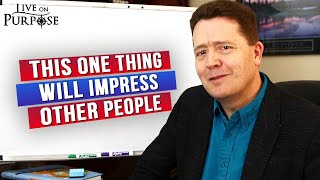First impressions are really important in a lot of different contexts in our life. You think about things like a job interview for example. Or social interactions or workplace interactions with co-workers or a customer or client. Those first impressions are really crucial.
Dr. Ann Demarais did some research years ago that illuminated the important aspects in forming a great first impression. She wrote the book “First Impressions,” which I highly recommend. We'll put a link down below. Dr. Demarais found that how we focus makes a big difference. So, let's take a look at how Dr. Demarais has set this up. Imagine a quadrant system and we will pick 2 elements to focus on so you can see exactly how this works. In the first column, our focus is how I feel in first person. So, I'm focused on how I feel as opposed to how you feel. Now, forgetting about the feelings for just a minute, let's go to the content. In the top row of the quadrant, it's about me. Now, you see how that's stacking up because this first quadrant would be how I feel about me. That's where my focus would be. Down on the bottom row, it's about you. My focus might be on how I feel about me, how you feel about me or how I feel about you. Or on how you feel about yourself. You can probably see where this is going. What Dr. Demarais pointed out is that if our focus is in one of the 3 quadrants, where our focus is on us, we tend to have a negative impact on that first impression that we're making.
Picture for just a minute that you are going into a job interview. This is a situation where you want to make a good first impression. What if I go into that job interview and all I can think about is how I feel about myself? “Am I good enough? Am I really prepared for this? Do I have this? Am I cute enough?” You can see that this kind of focus is going to have an impact. Not only on how you are feeling but on how that interviewer is feeling about you. What kind of first impression are you making? This tends to create an impact that we could label self-consciousness. And I'm not talking a healthy sense of self-awareness. I'm talking that anxious kind of tied up self-conscious approach. That's the impact that we are going to have. Is that really the kind of first impression you'll want to make? Yeah, probably not.
Let's move over to the next quadrant. Now, my focus is on how you feel about me. Again, in the job interview, if I go into that interview and my focus is on how that interviewer is feeling about me, what does that feel like? It's this anxious approach that has me all worried about how other people are feeling about me. And I'm trying to please you. And that comes across as phony. Not just phony but also insecure. That might be really devastating at my first impression, especially if the job that I'm applying for has something to do with interpersonal skills, and really which jobs don't. Most of them have some kind of importance on that interpersonal skill level.
Let's move down the quadrant. Now, my focus is on how I feel about you. Oh, that's going to go over well in an interview, isn't it? Picture that. I go into a job interview and I'm all thinking about, “Do I like you guys? Do I approve of what you're doing? Do I think that you've got what I'm looking for? No, I don't know if I approve of you.” How's that going to come across? Typically, that impacts people as being critical and that is how people think of you.
In Dr. Demarais research, she pointed out that we want to be in the last quadrant. This is where we create a great first impression. It means that my focus now is on how you feel about yourself. Wait a minute. That's kind of weird in a job interview, right? We all know that the objective of a job interview is to vet you for this position, right? But what if you show up with your own focus… I'm talking about where your own mind is. This is powerful because as you realize this, you're going to show up differently in the job interview. So, you show up there and your focus, your own mind, is on how that person feels about themselves. Isn't that brilliant? They are going to love you. But don't do it for that purpose. See, if you're doing it to get people to love you, then you are in a different quadrant. Now your focus is on how other people feel about us. We don't want to go there. We want to keep it genuine. So, you're not doing it to try to influence them or their thinking or their feelings about you. Just realize that if you do this well, all of that's going to happen, it's kind of like a strategic side effect. And that's what Dr. Demarais pointed out in her research. This is how we form and I think maintain a positive impression.
Beyond first impressions, this applies to ongoing impressions and relationships. That's a powerful relationship tool. Let's take a look at how this might play out in a social interaction. There is somebody that you want to get to know. Maybe it's for business networking, maybe it's for a romantic interest, just a new relationship. You want to make a good first impression, right? So, we are going to pay attention to where our focus is. Make sure in your own mind that your focus is on how that person feels about themselves. See a lot of times in an interaction, especially a first one, we make the mistake of starting to talk about me, right? Business networking is a great example of this. I've been to so many networking events where I interact with someone for the first time and all they can talk about is what they do and why they're so awesome. Not very impressive to me. I don't form a good first impression of them when they do that. There are other people who show up and they're all about focusing on me –what I do, how I feel about myself and my work. Those are the people I have the best first impression of.
So, take that information and switch it around. Now, you're the person doing the approaching. As you approach that person, your focus is on how they feel about themselves. So, you start asking questions like, “So, tell me about your job.” Okay, that's a good focus on them and how they feel about themselves. “What have you really enjoyed about your work? What's challenging about it?” So, you're asking questions about them. Could you do this in a job interview? Yeah, you could actually. As you're getting to know each other, you know that first part of the interview, you can say, “You know, I'm really intrigued with what you're doing here. Tell me how you got into this.” Wow, that's a little bit of a change, isn't it? And having those questions directed to this area of focus tends to impact how they feel in the interaction and it affects their first impression of you.

